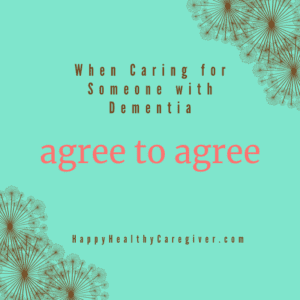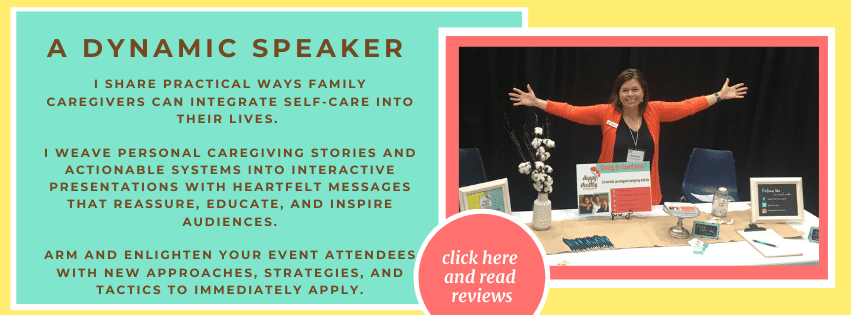You’ve heard the phrase ‘agree to disagree’. It’s been a phrase that has helped end probably countless conversations before they were to spiral downhill. A boundary that helps keep the peace among friends and loved ones….who don’t have a brain disease.
When it comes to caring for an aging parent or loved one with mid or late-stage dementia or Alzheimer’s, the advice I hear most from my caregiving friends and clients is to simply agree. No one will ever win an argument with someone who no longer has the capacity to use reason or logic.
As much as anyone’s instinct is to correct, contradict or question when hearing something they don’t agree with, arguing typically leads nowhere. Often, family caregivers who mean well when trying to reason with a care recipient with a brain disease usually just end up feeling even more frustrated.

Frustrating Stories from Caregivers
If you care for someone with dementia or Alzheimer’s, you may be able to relate to some of these situations I’ve heard:
– One family caregiver’s mother-in-law (MIL) left her dirty adult underwear on the bathroom sink with all the contents for the world to see. The dirty underwear was leaning against the family’s toothbrush holder! When the caregiver tried to explain to her MIL it wasn’t healthy to leave her dirty underwear next to the toothbrushes, the MIL looked at the caregiver as if she was looking right through her and said, “Well one of those toothbrushes is mine”. The same MIL has disposed of her adult underwear in various places around the house including her grandson’s bed. So far, they are hopeful they have solved this issue by purchasing a special disposal can.
– Other dementia caregivers have found their loved ones soaking their dirty disposable underwear in the sink, hanging them out to dry or trying to reuse their undergarments later. As I shared before caregiving can be a dirty job! And if you help care for someone with incontinence, join the Incontinence Community to connect with others, get advice and share your own tips. It’s a private Facebook group where you can learn how others deal with similar challenges. As family caregivers, we can do difficult things but we certainly don’t need to feel all alone in this journey. Connecting with others who completely understand what you are going through help and you may learn of a new strategy to make things go a bit more smoothly.
– Some stories are even more alarming like seeing a loved one with their hand down the kitchen sink intending to eat the scraps (thankfully the garbage disposal was off), or attempting to drink cleaning supplies, eat lotion, or share their social security number over the phone.
Do some of these occurrences sounds familiar?
Therapeutic Fibbing May Keep a Care Recipient Safe and Happy
Honesty is not always the best policy when it comes to caring for someone with dementia.
Your loved one truly believes what they saying – it’s what their brain is telling them. Dementia has physically altered their brains. We all rely on this amazing organ to control our personality, behaviors, decisions, memory, and judgment. No matter what your dementia care recipient is saying to you, avoid taking their words personally – it’s not them, it’s this devastating intensifying disease.
Replying to your care recipient with the truth can sometimes be mean. For example, if your aging parent thinks their spouse is still alive – what’s the benefit of correcting them and letting them know they have passed? Nothing good comes from watching this person experience grief, fear, and distress over and over. A simple statement like ‘he/she should be back from the store’ would be way more comforting for both of you.
From everything I’ve heard and read, dementia experts recommend just going with the flow. Join your loved one in their reality versus trying to pull them back into ours. They call this “therapeutic fibbing”. Essentially, therapeutic fibbing is agreeing or replying with untruths simply to avoid causing someone distress.
How do you go on this make-believe adventure? Ask an open question and then after time try to redirect your loved one’s attention to a different activity. Here’s a helpful article on therapeutic fibbing with examples of how these kinds of dialogues could play out.
Other Communication Tips for Dementia Caregivers
Validation therapy is another helpful communication technique one of the Happy Healthy Caregiver community members has had success with. She listed this in her article Things I Wish I’d Known Before I Became a Caregiver for My Mother with Dementia.
A few years back, I had the privilege of seeing Teepa Snow speak to a room of caregivers – giving us all tips on how to communicate better with our loved ones. Teepa’s talk was informative and entertaining! What I remember most is that how we say something is just as important as what we say. Talking directly to our care recipient in a soothing voice with a smile can go a long way.
Another suggestion I learned was to borrow the standard improv rule of saying ‘yes….and’. According to Silver Dawn’s Dementia RAW practice, saying “no” builds a wall in our communication where saying “yes” means we are in agreement physically or emotionally. The ‘and’ part just means we are adding something more.
One family caregiver has had success leaving subliminal notes around the house about where to dispose of adult underwear or writing other brief suggestions to promote the desired behavior like: eat a protein bar, don’t feed the dog, do not enter, take a bath, or flush the toilet. The idea is the care recipient will hopefully read the notes and perform the task without feeling they are being micro-managed or disrespected.
Happy Healthy Caregiver podcast episodes spotlighting dementia caregivers:
- Colleen Kavanaugh – Caregiver Spotlight Episode #18
- Christina Britton Conroy – Caregiver Spotlight Episode #39
- Susanne White – Caregiver Spotlight Episode #55
- Liz O’Donnell – Caregiver Spotlight Episode #63
- Nicole Rochester – Caregiver Spotlight Episode #69
- Lisa B. Capp – Caregiver Spotlight Episode #72
- Marianne Sciucco – Caregiver Spotlight Episode #75




